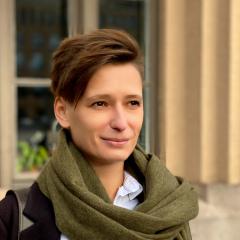

Could you tell us briefly about your Fulbright period in the U.S.? What did you do and what was it like?
Emilie: I was accepted to the prestigious Arts Management program in Columbia University in 2006 after receiving the Fulbright grant, as the first student from Finland throughout the programs history. I took my Master of Arts in 2008 after two years of intense study. During this period I also had the opportunity to gain work experience, and did two internships; one at the Metropolitan Opera and one at Jazz at Lincoln Center touring department. I enjoyed my time in New York tremendously, and I firmly believe my studies and work in the U.S. greatly enhanced my career opportunities later on. In Finland I would not have been able to gain the same vast and varied experience in the arts as I was able to in New York.
Laura: In 2009-2010 I had the opportunity to spend the academic year at UC Santa Barbara as an ASLA Fulbright Graduate Student. It was a crucial experience for the development of my academic skills and important for my PhD study on Sikh immigrants, as I had the chance to study at the Center for Sikh and Punjab Studies. During my time there I also was able to enlarge my academic network, which eventually led to an invitation of the renowned anthropologist Prof. George Marcus from UC Irvine to a conference in Jyväskylä. He actually came, which was a great follow-up of my Fulbright scholarship. The time in California is still very deeply rooted in the heart of my whole family, and perhaps it is not a surprise that my oldest daughter, who had been around three years old when we lived there, plans to move to Los Angeles one day.
You both have very successful careers. As you look back, do you think that your period as a Fulbright Finland fellow in some ways helped or contributed to your future career, and if so, how exactly?
Laura: My time as a Fulbright Finland fellow had in various ways an impact on my career. To start with, I can say that already the application process for the Fulbright scholarship prepared me for later job application processes, which demanded from me as much motivation, concentration and patience to go through with them. The time in California also improved my networking skills as well as my presentation skills that are very useful in my current position at the Finnish Institute in Berlin.
Emilie: As a Fulbright fellow I got many chances to broaden my network and got to be part of a very international, high profile academic group. I would not have been able to gain the same academic competences, international resources and knowhow early on, without my time as a Fulbright fellow. The academic resources of Columbia University are enormous and the reputation world class, which further enhanced my opportunities to stand out in the competitive arts field later on. My immersion in american society, networking and small talk also helped me gain international communication skills and made me more assured of myself in international settings. In short, I believe my Fulbright experience carries me forward daily.
Successful Fulbright alumni serve as role models for future generations of grantees. What would you say to encourage young Finns who are right now thinking about applying for Fulbright and about their future careers?
Emilie: I would encourage them to do a thorough job on the first application round, and to really consider all the aspects of the application process. I learned a great deal about recommendations “american style”, the differences in our cultures in applying and talking about yourself and once studying, the lesson continued throughout the two years in New York. When you get the grant, it is an amazing opportunity to learn, network and excel, so it is really worth the effort and time you put into it. The time as a Fulbright fellow, investing in my own knowledge and skills has repaid itself manyfold, and still continues to do so.
Laura: It might sound like a cliché, but the year in California was for sure one of the best years in my life. It is a unique chance to spend such a long time in the United States with the support and help of an institution such as Fulbright. The quality of teaching at the university is very high and it is a very motivating experience to attend classes or conference where those leading in your field are giving lectures or keynote speeches. Also the network of Fulbright fellows is very inspiring. Just two years ago I visited in New York a Fulbright fellow, whom I had hosted during his stay in Jyväskylä many years before.
Fulbright Finland grants are funded primarily by private Finnish foundations, Finnish universities, private partners, as well as donations by alumni and friends of the program. What would you say to our current and potential funders – i.e. in your opinion, why is it important to fund Fulbright grants?
Laura: Looking at the current global situation, I think that it is very important to finance structures that enhance the dialogue of people across national borders. Communication and dialogue between people do not happen always automatically and as smooth as we would wish. It is thus very important that we have structures and institutions such as Fulbright, who train the intercultural skills of people.
Emilie: I second Laura in how important these structures are. I also strongly believe, that I would never have been able to be so successful in my career, without this opportunity. It is extremely valuable to get international experience, very few fields can succeed on simply domestic knowledge. We need to value these opportunities and make sure also future generations have opportunities to get valuable international experience. It is a necessity for continued growth and collaboration in an international world.
Read the whole Fulbright Finland News magazine 1/2019!

